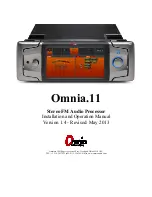
TIMER4
CPTS
TIMER5
TIMER6
TIMER7
portimerpwm
portimerpwm
portimerpwm
portimerpwm
hw1_ts_push
hw2_ts_push
hw3_ts_push
hw4_ts_push
piclktimer
piclktimer
piclktimer
piclktimer
TIMER_CLKSRC
Functional Description
Figure 14-12. HW1/4_TSP_PUSH Connection
The event is loaded into the event FIFO on the rising edge of the timer, and the PORT_NUMBER field in
the EVENT_HIGH register indicates the hardware time stamp input that caused the event.
Each hardware time stamp input must be asserted for at least 10 periods of the selected RCLK clock.
Each input can be enabled or disabled by setting the respective bits in the CONTROL register.
Hardware time stamps are intended to be an extremely low frequency signals, such that the event FIFO
does not overrun. Software must keep up with the event FIFO and ensure that there is no overrun, or
events will be lost.
14.3.7.2.4.5 Ethernet Port Events
14.3.7.2.4.5.1 Ethernet Port Receive Event
Each ethernet port can generate a receive ethernet event. Receive ethernet events are generated for valid
received time sync packets. There are two CPTS interfaces for each ethernet receive port. The first is the
Px_TS_RX_MII interface and the second is the Px_TS_RX_DEC interface. Information from these
interfaces is used to generates an ethernet receive event for each ethernet time sync packet received on
the associated port.
The Px_TS_RX_MII interface issues a record signal (pX_ts_rx_mii_rec) along with a handle
(pX_ts_rx_mii_hndl) for each packet (every packet) that is received on the associated ethernet port. The
record signal is a single clock pulse indicating that a receive packet has been detected at the associated
port MII interface. The handle value is incremented with each packet and rolls over to zero after 15.
There are 16 possible handle values so there can be a maximum of 16 packets “in flight” from the
TS_RX_MII to the TS_RX_DEC block at any given time. A handle value is reused (not incremented) for
any received packet that is shorter than about 31 octets (including preamble). Handle reuse on short
packets prevents any possible overrun condition (more than 16 “in flight” packets) if multiple fragments are
consecutively received.
Valid receive ethernet time sync events are signaled to the CPTS via the Px_TS_RX_DEC interface.
When the pX_ts_rx_dec_evnt is asserted, a valid event is detected and will be loaded into the event FIFO.
Only valid receive time sync packets are indicated on the Px_TS_RX_DEC interface. The
pX_ts_rx_dec_hndl, pX_ts_rx_dec_msg_type, and pX_ts_rx_dec_seq_id signals are registered on an
asserted pX_ts_rx_dec_evnt. When a Tx_TS_RX_DEC event is asserted, the handle value is used to
retrieve the time stamp that was loaded with the same handle value from the Px_TS_RX_MII interface.
1231
SPRUH73H – October 2011 – Revised April 2013
Ethernet Subsystem
Copyright © 2011–2013, Texas Instruments Incorporated















































